Research Proposal: Governance, Complexity, Resilience in the UK
VerifiedAdded on 2020/06/05
|13
|4149
|50
Project
AI Summary
This research proposal examines the intricate relationship between governance, complexity, and resilience, specifically within the context of the UK economy. It aims to ascertain the impact of these factors on society, exploring challenges posed by complex social-ecological systems and the importance of redesigning political and tax systems with interlinked infrastructure. The proposal outlines objectives including identifying governance challenges, understanding the importance of redesigning political and tax systems, examining the main dimensions of resilience, and recommending strategies for managing complexity. The literature review covers governance, resilience, taxation, and economic growth. The methodology includes research philosophy, approach, design, data collection, and analysis. The research seeks to understand how governance, complexity, and resilience influence economic development and offers recommendations for policymakers to formulate better strategies. The research is motivated by a gap in the understanding of how these elements influence the UK's economic and social landscape. The research will use various sources to gather data to assess the impact of these elements on the UK economy.

PROPOSAL
Paraphrase This Document
Need a fresh take? Get an instant paraphrase of this document with our AI Paraphraser
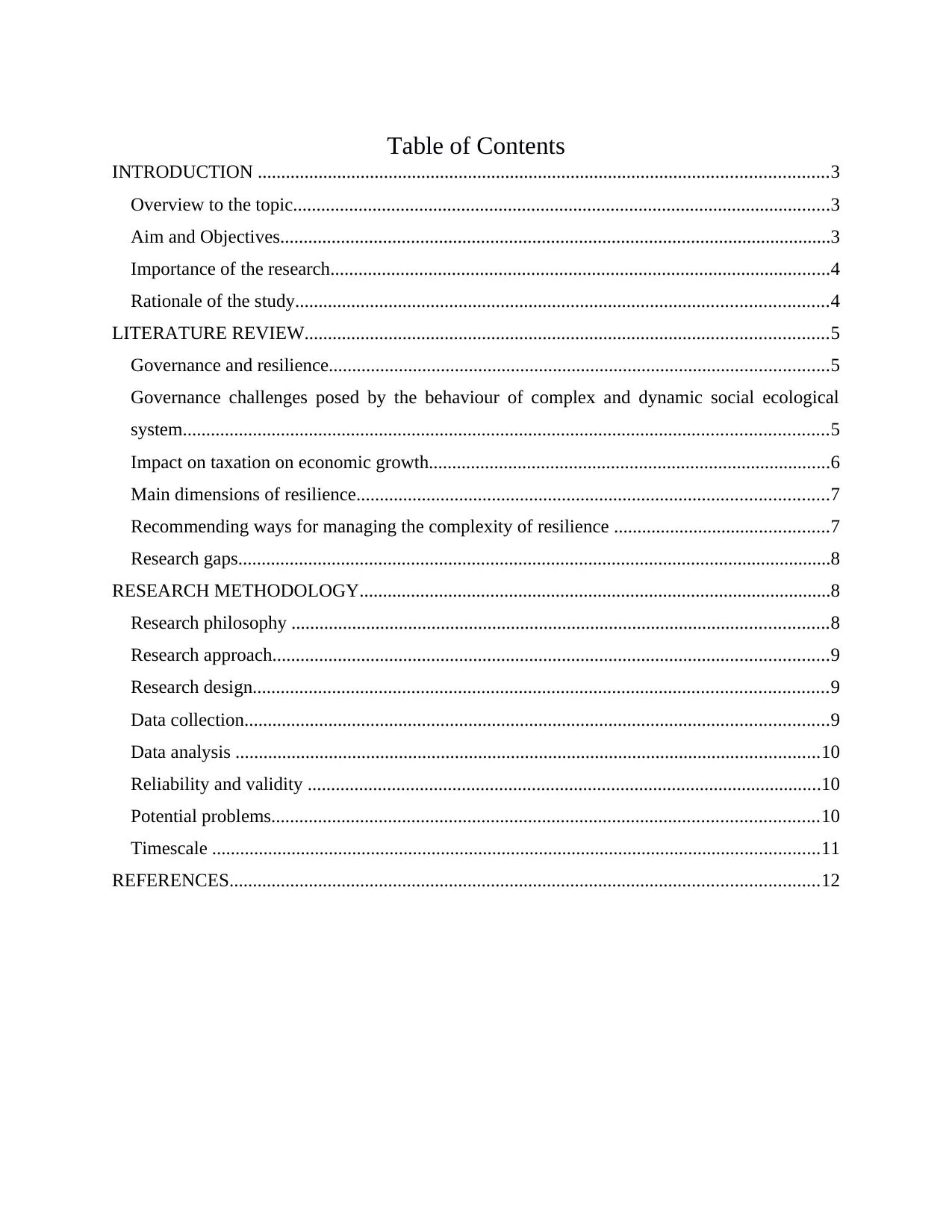
Table of Contents
INTRODUCTION ..........................................................................................................................3
Overview to the topic...................................................................................................................3
Aim and Objectives......................................................................................................................3
Importance of the research...........................................................................................................4
Rationale of the study..................................................................................................................4
LITERATURE REVIEW................................................................................................................5
Governance and resilience...........................................................................................................5
Governance challenges posed by the behaviour of complex and dynamic social ecological
system..........................................................................................................................................5
Impact on taxation on economic growth......................................................................................6
Main dimensions of resilience.....................................................................................................7
Recommending ways for managing the complexity of resilience ..............................................7
Research gaps...............................................................................................................................8
RESEARCH METHODOLOGY.....................................................................................................8
Research philosophy ...................................................................................................................8
Research approach.......................................................................................................................9
Research design...........................................................................................................................9
Data collection.............................................................................................................................9
Data analysis .............................................................................................................................10
Reliability and validity ..............................................................................................................10
Potential problems.....................................................................................................................10
Timescale ..................................................................................................................................11
REFERENCES..............................................................................................................................12
INTRODUCTION ..........................................................................................................................3
Overview to the topic...................................................................................................................3
Aim and Objectives......................................................................................................................3
Importance of the research...........................................................................................................4
Rationale of the study..................................................................................................................4
LITERATURE REVIEW................................................................................................................5
Governance and resilience...........................................................................................................5
Governance challenges posed by the behaviour of complex and dynamic social ecological
system..........................................................................................................................................5
Impact on taxation on economic growth......................................................................................6
Main dimensions of resilience.....................................................................................................7
Recommending ways for managing the complexity of resilience ..............................................7
Research gaps...............................................................................................................................8
RESEARCH METHODOLOGY.....................................................................................................8
Research philosophy ...................................................................................................................8
Research approach.......................................................................................................................9
Research design...........................................................................................................................9
Data collection.............................................................................................................................9
Data analysis .............................................................................................................................10
Reliability and validity ..............................................................................................................10
Potential problems.....................................................................................................................10
Timescale ..................................................................................................................................11
REFERENCES..............................................................................................................................12
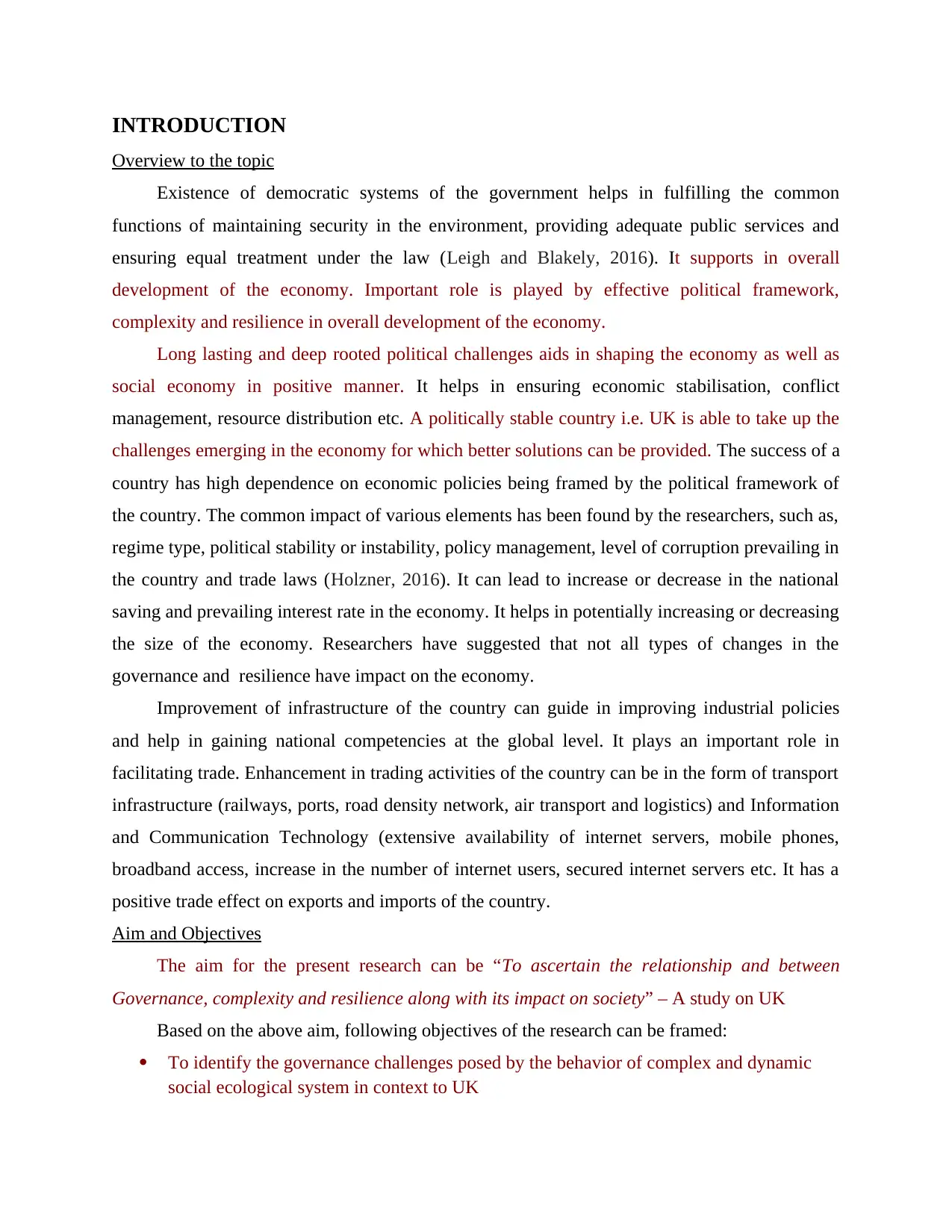
INTRODUCTION
Overview to the topic
Existence of democratic systems of the government helps in fulfilling the common
functions of maintaining security in the environment, providing adequate public services and
ensuring equal treatment under the law (Leigh and Blakely, 2016). It supports in overall
development of the economy. Important role is played by effective political framework,
complexity and resilience in overall development of the economy.
Long lasting and deep rooted political challenges aids in shaping the economy as well as
social economy in positive manner. It helps in ensuring economic stabilisation, conflict
management, resource distribution etc. A politically stable country i.e. UK is able to take up the
challenges emerging in the economy for which better solutions can be provided. The success of a
country has high dependence on economic policies being framed by the political framework of
the country. The common impact of various elements has been found by the researchers, such as,
regime type, political stability or instability, policy management, level of corruption prevailing in
the country and trade laws (Holzner, 2016). It can lead to increase or decrease in the national
saving and prevailing interest rate in the economy. It helps in potentially increasing or decreasing
the size of the economy. Researchers have suggested that not all types of changes in the
governance and resilience have impact on the economy.
Improvement of infrastructure of the country can guide in improving industrial policies
and help in gaining national competencies at the global level. It plays an important role in
facilitating trade. Enhancement in trading activities of the country can be in the form of transport
infrastructure (railways, ports, road density network, air transport and logistics) and Information
and Communication Technology (extensive availability of internet servers, mobile phones,
broadband access, increase in the number of internet users, secured internet servers etc. It has a
positive trade effect on exports and imports of the country.
Aim and Objectives
The aim for the present research can be “To ascertain the relationship and between
Governance, complexity and resilience along with its impact on society” – A study on UK
Based on the above aim, following objectives of the research can be framed:
To identify the governance challenges posed by the behavior of complex and dynamic
social ecological system in context to UK
Overview to the topic
Existence of democratic systems of the government helps in fulfilling the common
functions of maintaining security in the environment, providing adequate public services and
ensuring equal treatment under the law (Leigh and Blakely, 2016). It supports in overall
development of the economy. Important role is played by effective political framework,
complexity and resilience in overall development of the economy.
Long lasting and deep rooted political challenges aids in shaping the economy as well as
social economy in positive manner. It helps in ensuring economic stabilisation, conflict
management, resource distribution etc. A politically stable country i.e. UK is able to take up the
challenges emerging in the economy for which better solutions can be provided. The success of a
country has high dependence on economic policies being framed by the political framework of
the country. The common impact of various elements has been found by the researchers, such as,
regime type, political stability or instability, policy management, level of corruption prevailing in
the country and trade laws (Holzner, 2016). It can lead to increase or decrease in the national
saving and prevailing interest rate in the economy. It helps in potentially increasing or decreasing
the size of the economy. Researchers have suggested that not all types of changes in the
governance and resilience have impact on the economy.
Improvement of infrastructure of the country can guide in improving industrial policies
and help in gaining national competencies at the global level. It plays an important role in
facilitating trade. Enhancement in trading activities of the country can be in the form of transport
infrastructure (railways, ports, road density network, air transport and logistics) and Information
and Communication Technology (extensive availability of internet servers, mobile phones,
broadband access, increase in the number of internet users, secured internet servers etc. It has a
positive trade effect on exports and imports of the country.
Aim and Objectives
The aim for the present research can be “To ascertain the relationship and between
Governance, complexity and resilience along with its impact on society” – A study on UK
Based on the above aim, following objectives of the research can be framed:
To identify the governance challenges posed by the behavior of complex and dynamic
social ecological system in context to UK
⊘ This is a preview!⊘
Do you want full access?
Subscribe today to unlock all pages.

Trusted by 1+ million students worldwide
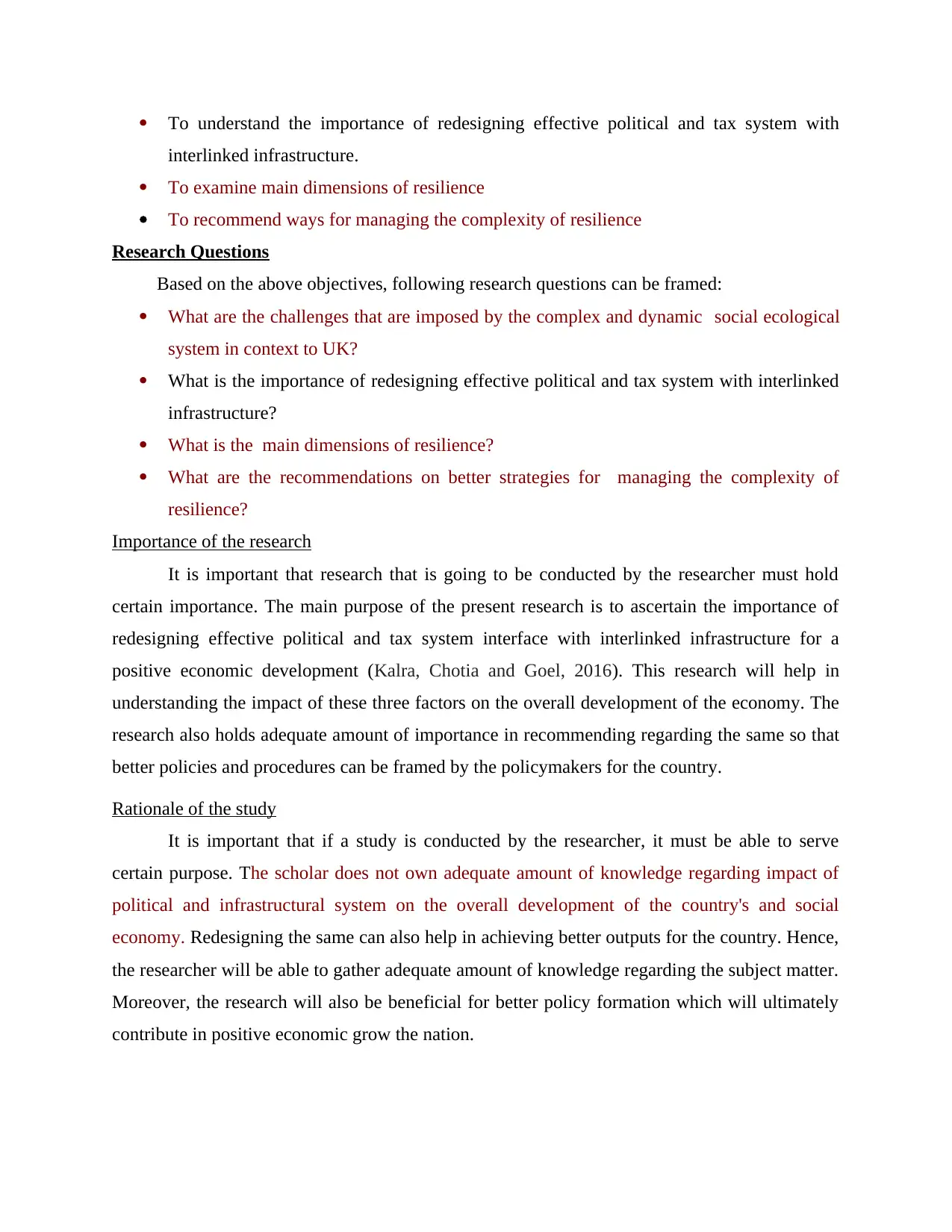
To understand the importance of redesigning effective political and tax system with
interlinked infrastructure.
To examine main dimensions of resilience
To recommend ways for managing the complexity of resilience
Research Questions
Based on the above objectives, following research questions can be framed:
What are the challenges that are imposed by the complex and dynamic social ecological
system in context to UK?
What is the importance of redesigning effective political and tax system with interlinked
infrastructure?
What is the main dimensions of resilience?
What are the recommendations on better strategies for managing the complexity of
resilience?
Importance of the research
It is important that research that is going to be conducted by the researcher must hold
certain importance. The main purpose of the present research is to ascertain the importance of
redesigning effective political and tax system interface with interlinked infrastructure for a
positive economic development (Kalra, Chotia and Goel, 2016). This research will help in
understanding the impact of these three factors on the overall development of the economy. The
research also holds adequate amount of importance in recommending regarding the same so that
better policies and procedures can be framed by the policymakers for the country.
Rationale of the study
It is important that if a study is conducted by the researcher, it must be able to serve
certain purpose. The scholar does not own adequate amount of knowledge regarding impact of
political and infrastructural system on the overall development of the country's and social
economy. Redesigning the same can also help in achieving better outputs for the country. Hence,
the researcher will be able to gather adequate amount of knowledge regarding the subject matter.
Moreover, the research will also be beneficial for better policy formation which will ultimately
contribute in positive economic grow the nation.
interlinked infrastructure.
To examine main dimensions of resilience
To recommend ways for managing the complexity of resilience
Research Questions
Based on the above objectives, following research questions can be framed:
What are the challenges that are imposed by the complex and dynamic social ecological
system in context to UK?
What is the importance of redesigning effective political and tax system with interlinked
infrastructure?
What is the main dimensions of resilience?
What are the recommendations on better strategies for managing the complexity of
resilience?
Importance of the research
It is important that research that is going to be conducted by the researcher must hold
certain importance. The main purpose of the present research is to ascertain the importance of
redesigning effective political and tax system interface with interlinked infrastructure for a
positive economic development (Kalra, Chotia and Goel, 2016). This research will help in
understanding the impact of these three factors on the overall development of the economy. The
research also holds adequate amount of importance in recommending regarding the same so that
better policies and procedures can be framed by the policymakers for the country.
Rationale of the study
It is important that if a study is conducted by the researcher, it must be able to serve
certain purpose. The scholar does not own adequate amount of knowledge regarding impact of
political and infrastructural system on the overall development of the country's and social
economy. Redesigning the same can also help in achieving better outputs for the country. Hence,
the researcher will be able to gather adequate amount of knowledge regarding the subject matter.
Moreover, the research will also be beneficial for better policy formation which will ultimately
contribute in positive economic grow the nation.
Paraphrase This Document
Need a fresh take? Get an instant paraphrase of this document with our AI Paraphraser
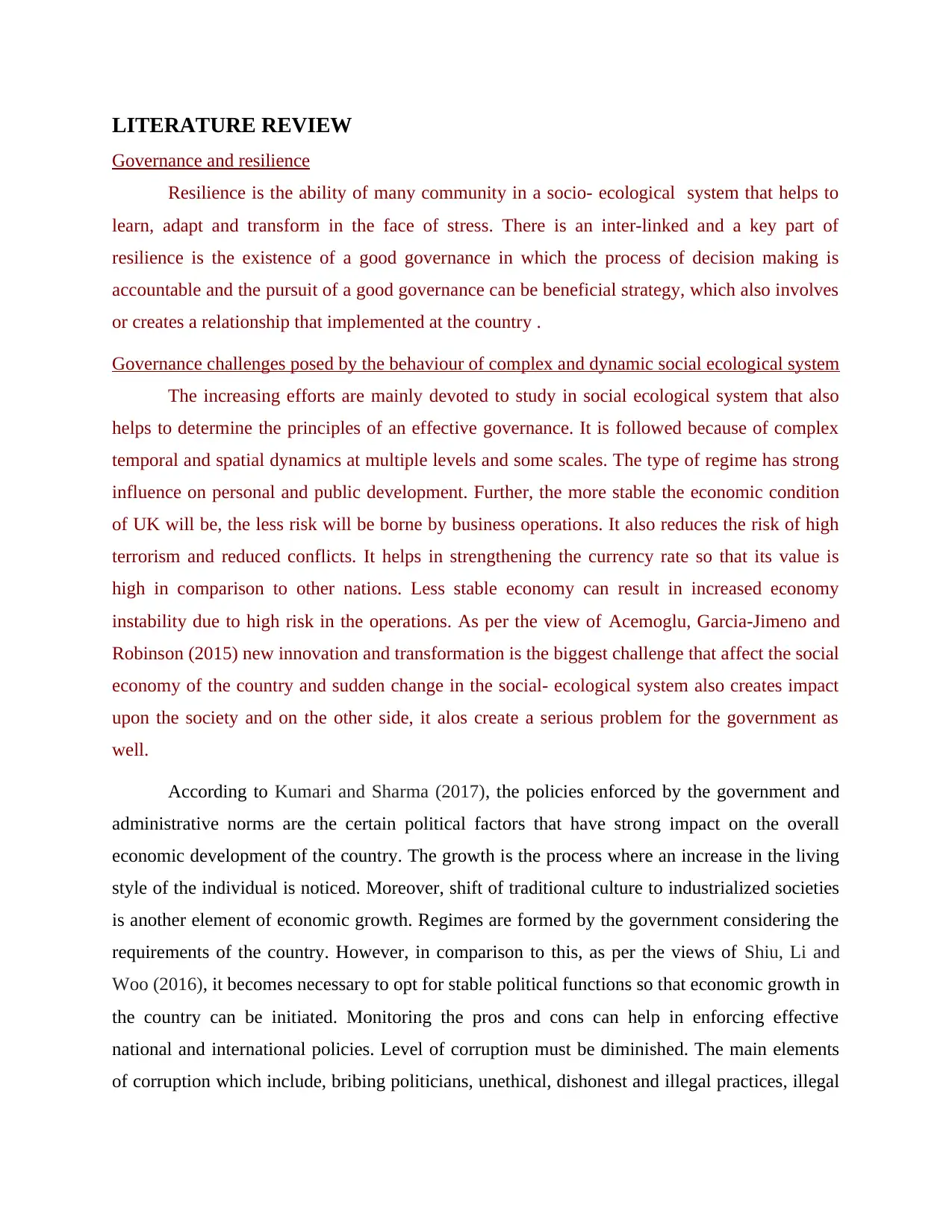
LITERATURE REVIEW
Governance and resilience
Resilience is the ability of many community in a socio- ecological system that helps to
learn, adapt and transform in the face of stress. There is an inter-linked and a key part of
resilience is the existence of a good governance in which the process of decision making is
accountable and the pursuit of a good governance can be beneficial strategy, which also involves
or creates a relationship that implemented at the country .
Governance challenges posed by the behaviour of complex and dynamic social ecological system
The increasing efforts are mainly devoted to study in social ecological system that also
helps to determine the principles of an effective governance. It is followed because of complex
temporal and spatial dynamics at multiple levels and some scales. The type of regime has strong
influence on personal and public development. Further, the more stable the economic condition
of UK will be, the less risk will be borne by business operations. It also reduces the risk of high
terrorism and reduced conflicts. It helps in strengthening the currency rate so that its value is
high in comparison to other nations. Less stable economy can result in increased economy
instability due to high risk in the operations. As per the view of Acemoglu, Garcia-Jimeno and
Robinson (2015) new innovation and transformation is the biggest challenge that affect the social
economy of the country and sudden change in the social- ecological system also creates impact
upon the society and on the other side, it alos create a serious problem for the government as
well.
According to Kumari and Sharma (2017), the policies enforced by the government and
administrative norms are the certain political factors that have strong impact on the overall
economic development of the country. The growth is the process where an increase in the living
style of the individual is noticed. Moreover, shift of traditional culture to industrialized societies
is another element of economic growth. Regimes are formed by the government considering the
requirements of the country. However, in comparison to this, as per the views of Shiu, Li and
Woo (2016), it becomes necessary to opt for stable political functions so that economic growth in
the country can be initiated. Monitoring the pros and cons can help in enforcing effective
national and international policies. Level of corruption must be diminished. The main elements
of corruption which include, bribing politicians, unethical, dishonest and illegal practices, illegal
Governance and resilience
Resilience is the ability of many community in a socio- ecological system that helps to
learn, adapt and transform in the face of stress. There is an inter-linked and a key part of
resilience is the existence of a good governance in which the process of decision making is
accountable and the pursuit of a good governance can be beneficial strategy, which also involves
or creates a relationship that implemented at the country .
Governance challenges posed by the behaviour of complex and dynamic social ecological system
The increasing efforts are mainly devoted to study in social ecological system that also
helps to determine the principles of an effective governance. It is followed because of complex
temporal and spatial dynamics at multiple levels and some scales. The type of regime has strong
influence on personal and public development. Further, the more stable the economic condition
of UK will be, the less risk will be borne by business operations. It also reduces the risk of high
terrorism and reduced conflicts. It helps in strengthening the currency rate so that its value is
high in comparison to other nations. Less stable economy can result in increased economy
instability due to high risk in the operations. As per the view of Acemoglu, Garcia-Jimeno and
Robinson (2015) new innovation and transformation is the biggest challenge that affect the social
economy of the country and sudden change in the social- ecological system also creates impact
upon the society and on the other side, it alos create a serious problem for the government as
well.
According to Kumari and Sharma (2017), the policies enforced by the government and
administrative norms are the certain political factors that have strong impact on the overall
economic development of the country. The growth is the process where an increase in the living
style of the individual is noticed. Moreover, shift of traditional culture to industrialized societies
is another element of economic growth. Regimes are formed by the government considering the
requirements of the country. However, in comparison to this, as per the views of Shiu, Li and
Woo (2016), it becomes necessary to opt for stable political functions so that economic growth in
the country can be initiated. Monitoring the pros and cons can help in enforcing effective
national and international policies. Level of corruption must be diminished. The main elements
of corruption which include, bribing politicians, unethical, dishonest and illegal practices, illegal
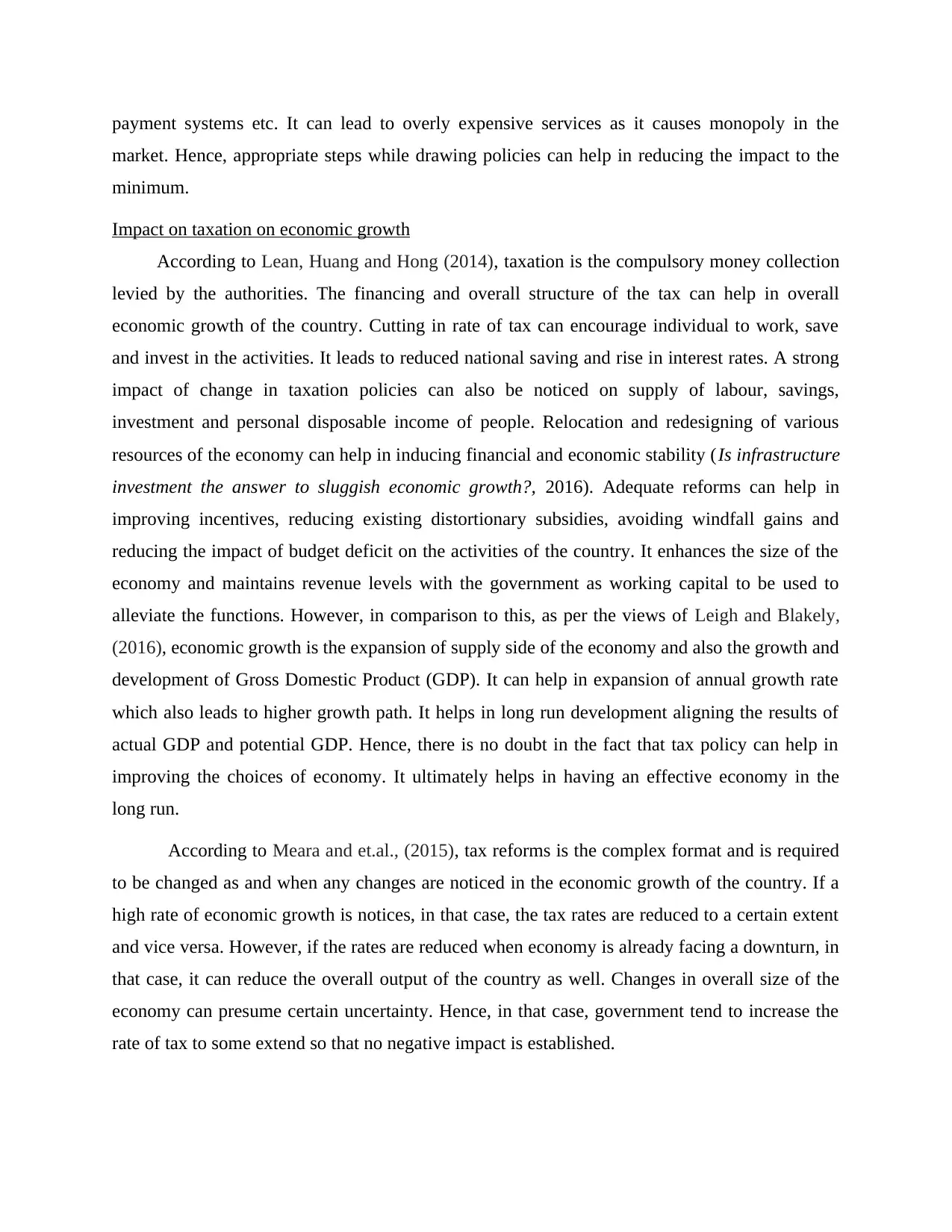
payment systems etc. It can lead to overly expensive services as it causes monopoly in the
market. Hence, appropriate steps while drawing policies can help in reducing the impact to the
minimum.
Impact on taxation on economic growth
According to Lean, Huang and Hong (2014), taxation is the compulsory money collection
levied by the authorities. The financing and overall structure of the tax can help in overall
economic growth of the country. Cutting in rate of tax can encourage individual to work, save
and invest in the activities. It leads to reduced national saving and rise in interest rates. A strong
impact of change in taxation policies can also be noticed on supply of labour, savings,
investment and personal disposable income of people. Relocation and redesigning of various
resources of the economy can help in inducing financial and economic stability (Is infrastructure
investment the answer to sluggish economic growth?, 2016). Adequate reforms can help in
improving incentives, reducing existing distortionary subsidies, avoiding windfall gains and
reducing the impact of budget deficit on the activities of the country. It enhances the size of the
economy and maintains revenue levels with the government as working capital to be used to
alleviate the functions. However, in comparison to this, as per the views of Leigh and Blakely,
(2016), economic growth is the expansion of supply side of the economy and also the growth and
development of Gross Domestic Product (GDP). It can help in expansion of annual growth rate
which also leads to higher growth path. It helps in long run development aligning the results of
actual GDP and potential GDP. Hence, there is no doubt in the fact that tax policy can help in
improving the choices of economy. It ultimately helps in having an effective economy in the
long run.
According to Meara and et.al., (2015), tax reforms is the complex format and is required
to be changed as and when any changes are noticed in the economic growth of the country. If a
high rate of economic growth is notices, in that case, the tax rates are reduced to a certain extent
and vice versa. However, if the rates are reduced when economy is already facing a downturn, in
that case, it can reduce the overall output of the country as well. Changes in overall size of the
economy can presume certain uncertainty. Hence, in that case, government tend to increase the
rate of tax to some extend so that no negative impact is established.
market. Hence, appropriate steps while drawing policies can help in reducing the impact to the
minimum.
Impact on taxation on economic growth
According to Lean, Huang and Hong (2014), taxation is the compulsory money collection
levied by the authorities. The financing and overall structure of the tax can help in overall
economic growth of the country. Cutting in rate of tax can encourage individual to work, save
and invest in the activities. It leads to reduced national saving and rise in interest rates. A strong
impact of change in taxation policies can also be noticed on supply of labour, savings,
investment and personal disposable income of people. Relocation and redesigning of various
resources of the economy can help in inducing financial and economic stability (Is infrastructure
investment the answer to sluggish economic growth?, 2016). Adequate reforms can help in
improving incentives, reducing existing distortionary subsidies, avoiding windfall gains and
reducing the impact of budget deficit on the activities of the country. It enhances the size of the
economy and maintains revenue levels with the government as working capital to be used to
alleviate the functions. However, in comparison to this, as per the views of Leigh and Blakely,
(2016), economic growth is the expansion of supply side of the economy and also the growth and
development of Gross Domestic Product (GDP). It can help in expansion of annual growth rate
which also leads to higher growth path. It helps in long run development aligning the results of
actual GDP and potential GDP. Hence, there is no doubt in the fact that tax policy can help in
improving the choices of economy. It ultimately helps in having an effective economy in the
long run.
According to Meara and et.al., (2015), tax reforms is the complex format and is required
to be changed as and when any changes are noticed in the economic growth of the country. If a
high rate of economic growth is notices, in that case, the tax rates are reduced to a certain extent
and vice versa. However, if the rates are reduced when economy is already facing a downturn, in
that case, it can reduce the overall output of the country as well. Changes in overall size of the
economy can presume certain uncertainty. Hence, in that case, government tend to increase the
rate of tax to some extend so that no negative impact is established.
⊘ This is a preview!⊘
Do you want full access?
Subscribe today to unlock all pages.

Trusted by 1+ million students worldwide
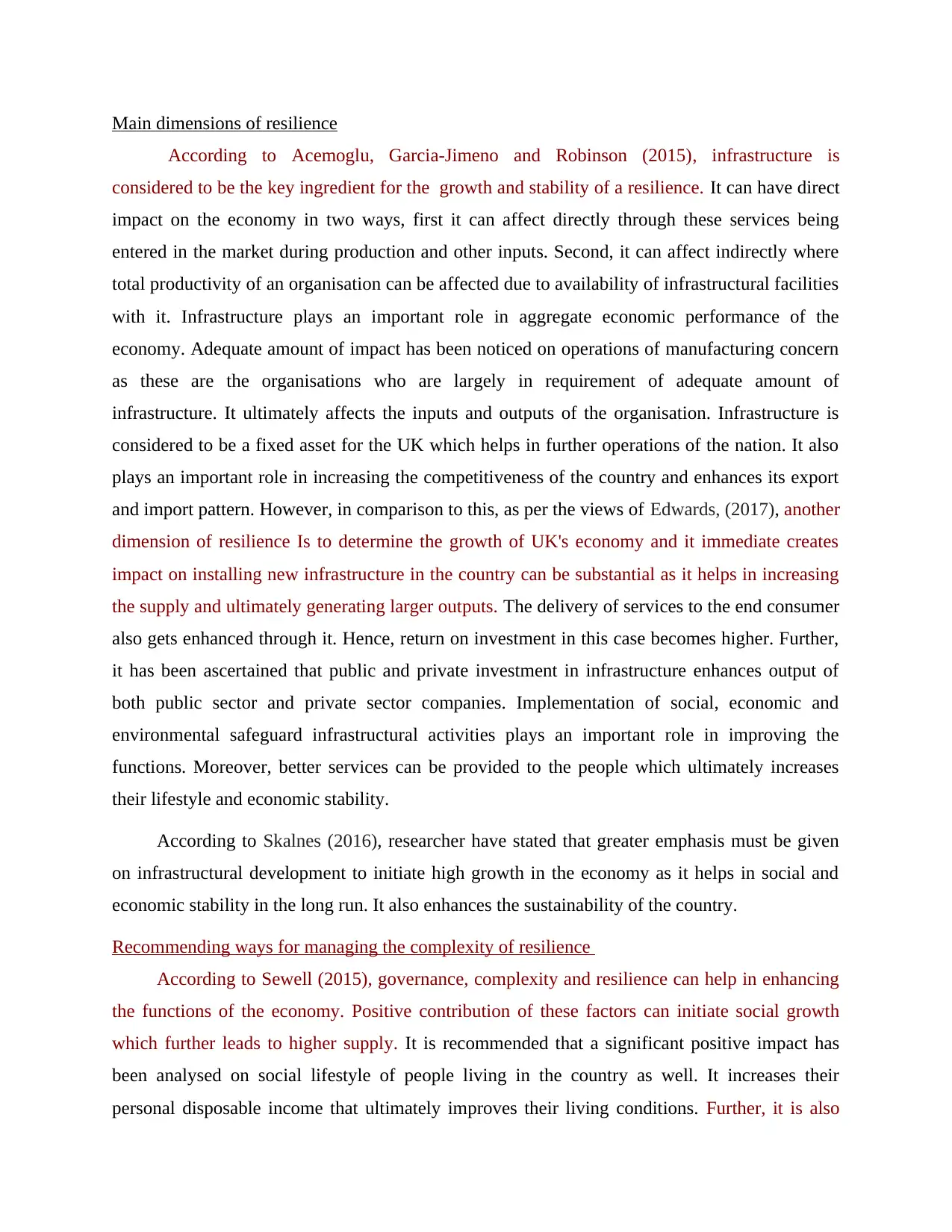
Main dimensions of resilience
According to Acemoglu, Garcia-Jimeno and Robinson (2015), infrastructure is
considered to be the key ingredient for the growth and stability of a resilience. It can have direct
impact on the economy in two ways, first it can affect directly through these services being
entered in the market during production and other inputs. Second, it can affect indirectly where
total productivity of an organisation can be affected due to availability of infrastructural facilities
with it. Infrastructure plays an important role in aggregate economic performance of the
economy. Adequate amount of impact has been noticed on operations of manufacturing concern
as these are the organisations who are largely in requirement of adequate amount of
infrastructure. It ultimately affects the inputs and outputs of the organisation. Infrastructure is
considered to be a fixed asset for the UK which helps in further operations of the nation. It also
plays an important role in increasing the competitiveness of the country and enhances its export
and import pattern. However, in comparison to this, as per the views of Edwards, (2017), another
dimension of resilience Is to determine the growth of UK's economy and it immediate creates
impact on installing new infrastructure in the country can be substantial as it helps in increasing
the supply and ultimately generating larger outputs. The delivery of services to the end consumer
also gets enhanced through it. Hence, return on investment in this case becomes higher. Further,
it has been ascertained that public and private investment in infrastructure enhances output of
both public sector and private sector companies. Implementation of social, economic and
environmental safeguard infrastructural activities plays an important role in improving the
functions. Moreover, better services can be provided to the people which ultimately increases
their lifestyle and economic stability.
According to Skalnes (2016), researcher have stated that greater emphasis must be given
on infrastructural development to initiate high growth in the economy as it helps in social and
economic stability in the long run. It also enhances the sustainability of the country.
Recommending ways for managing the complexity of resilience
According to Sewell (2015), governance, complexity and resilience can help in enhancing
the functions of the economy. Positive contribution of these factors can initiate social growth
which further leads to higher supply. It is recommended that a significant positive impact has
been analysed on social lifestyle of people living in the country as well. It increases their
personal disposable income that ultimately improves their living conditions. Further, it is also
According to Acemoglu, Garcia-Jimeno and Robinson (2015), infrastructure is
considered to be the key ingredient for the growth and stability of a resilience. It can have direct
impact on the economy in two ways, first it can affect directly through these services being
entered in the market during production and other inputs. Second, it can affect indirectly where
total productivity of an organisation can be affected due to availability of infrastructural facilities
with it. Infrastructure plays an important role in aggregate economic performance of the
economy. Adequate amount of impact has been noticed on operations of manufacturing concern
as these are the organisations who are largely in requirement of adequate amount of
infrastructure. It ultimately affects the inputs and outputs of the organisation. Infrastructure is
considered to be a fixed asset for the UK which helps in further operations of the nation. It also
plays an important role in increasing the competitiveness of the country and enhances its export
and import pattern. However, in comparison to this, as per the views of Edwards, (2017), another
dimension of resilience Is to determine the growth of UK's economy and it immediate creates
impact on installing new infrastructure in the country can be substantial as it helps in increasing
the supply and ultimately generating larger outputs. The delivery of services to the end consumer
also gets enhanced through it. Hence, return on investment in this case becomes higher. Further,
it has been ascertained that public and private investment in infrastructure enhances output of
both public sector and private sector companies. Implementation of social, economic and
environmental safeguard infrastructural activities plays an important role in improving the
functions. Moreover, better services can be provided to the people which ultimately increases
their lifestyle and economic stability.
According to Skalnes (2016), researcher have stated that greater emphasis must be given
on infrastructural development to initiate high growth in the economy as it helps in social and
economic stability in the long run. It also enhances the sustainability of the country.
Recommending ways for managing the complexity of resilience
According to Sewell (2015), governance, complexity and resilience can help in enhancing
the functions of the economy. Positive contribution of these factors can initiate social growth
which further leads to higher supply. It is recommended that a significant positive impact has
been analysed on social lifestyle of people living in the country as well. It increases their
personal disposable income that ultimately improves their living conditions. Further, it is also
Paraphrase This Document
Need a fresh take? Get an instant paraphrase of this document with our AI Paraphraser
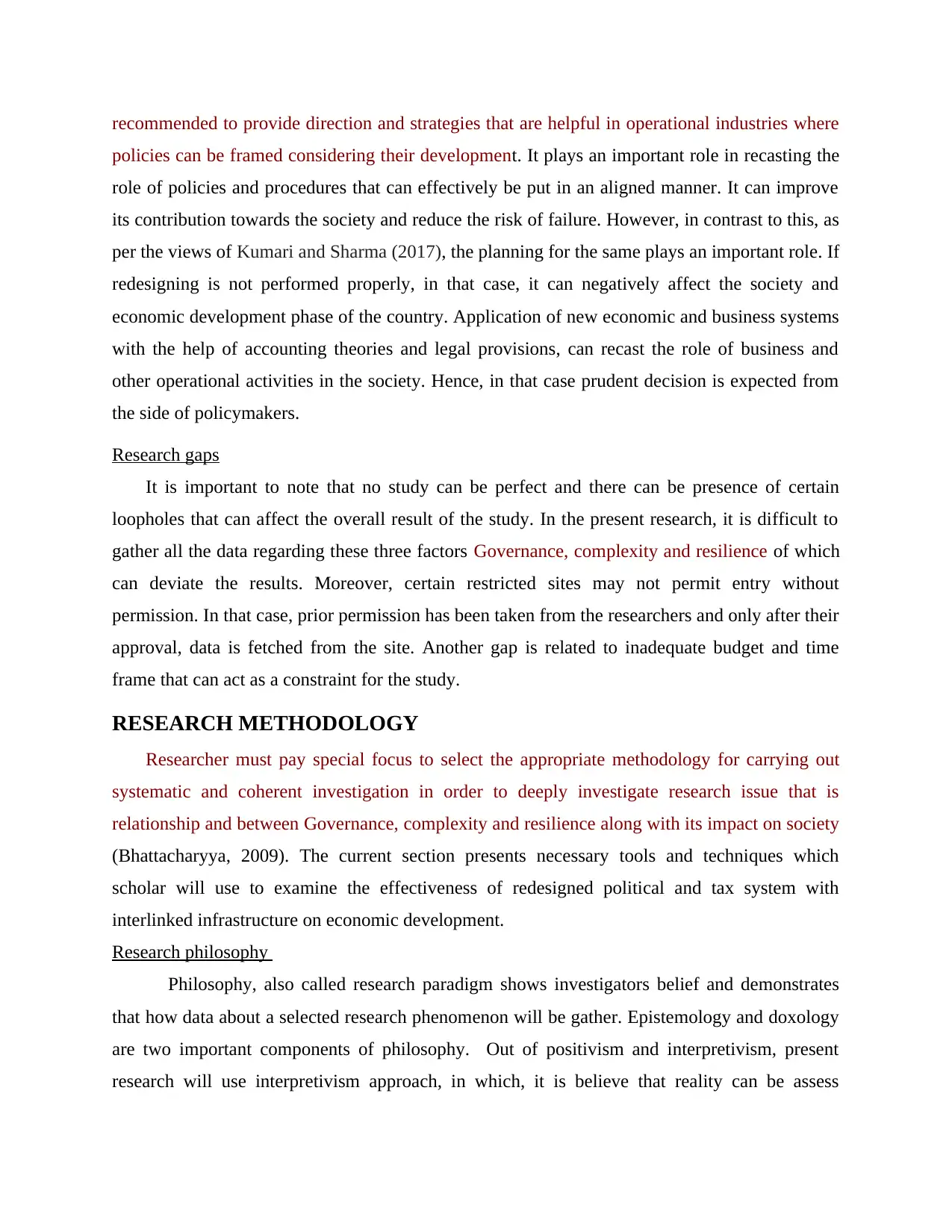
recommended to provide direction and strategies that are helpful in operational industries where
policies can be framed considering their development. It plays an important role in recasting the
role of policies and procedures that can effectively be put in an aligned manner. It can improve
its contribution towards the society and reduce the risk of failure. However, in contrast to this, as
per the views of Kumari and Sharma (2017), the planning for the same plays an important role. If
redesigning is not performed properly, in that case, it can negatively affect the society and
economic development phase of the country. Application of new economic and business systems
with the help of accounting theories and legal provisions, can recast the role of business and
other operational activities in the society. Hence, in that case prudent decision is expected from
the side of policymakers.
Research gaps
It is important to note that no study can be perfect and there can be presence of certain
loopholes that can affect the overall result of the study. In the present research, it is difficult to
gather all the data regarding these three factors Governance, complexity and resilience of which
can deviate the results. Moreover, certain restricted sites may not permit entry without
permission. In that case, prior permission has been taken from the researchers and only after their
approval, data is fetched from the site. Another gap is related to inadequate budget and time
frame that can act as a constraint for the study.
RESEARCH METHODOLOGY
Researcher must pay special focus to select the appropriate methodology for carrying out
systematic and coherent investigation in order to deeply investigate research issue that is
relationship and between Governance, complexity and resilience along with its impact on society
(Bhattacharyya, 2009). The current section presents necessary tools and techniques which
scholar will use to examine the effectiveness of redesigned political and tax system with
interlinked infrastructure on economic development.
Research philosophy
Philosophy, also called research paradigm shows investigators belief and demonstrates
that how data about a selected research phenomenon will be gather. Epistemology and doxology
are two important components of philosophy. Out of positivism and interpretivism, present
research will use interpretivism approach, in which, it is believe that reality can be assess
policies can be framed considering their development. It plays an important role in recasting the
role of policies and procedures that can effectively be put in an aligned manner. It can improve
its contribution towards the society and reduce the risk of failure. However, in contrast to this, as
per the views of Kumari and Sharma (2017), the planning for the same plays an important role. If
redesigning is not performed properly, in that case, it can negatively affect the society and
economic development phase of the country. Application of new economic and business systems
with the help of accounting theories and legal provisions, can recast the role of business and
other operational activities in the society. Hence, in that case prudent decision is expected from
the side of policymakers.
Research gaps
It is important to note that no study can be perfect and there can be presence of certain
loopholes that can affect the overall result of the study. In the present research, it is difficult to
gather all the data regarding these three factors Governance, complexity and resilience of which
can deviate the results. Moreover, certain restricted sites may not permit entry without
permission. In that case, prior permission has been taken from the researchers and only after their
approval, data is fetched from the site. Another gap is related to inadequate budget and time
frame that can act as a constraint for the study.
RESEARCH METHODOLOGY
Researcher must pay special focus to select the appropriate methodology for carrying out
systematic and coherent investigation in order to deeply investigate research issue that is
relationship and between Governance, complexity and resilience along with its impact on society
(Bhattacharyya, 2009). The current section presents necessary tools and techniques which
scholar will use to examine the effectiveness of redesigned political and tax system with
interlinked infrastructure on economic development.
Research philosophy
Philosophy, also called research paradigm shows investigators belief and demonstrates
that how data about a selected research phenomenon will be gather. Epistemology and doxology
are two important components of philosophy. Out of positivism and interpretivism, present
research will use interpretivism approach, in which, it is believe that reality can be assess
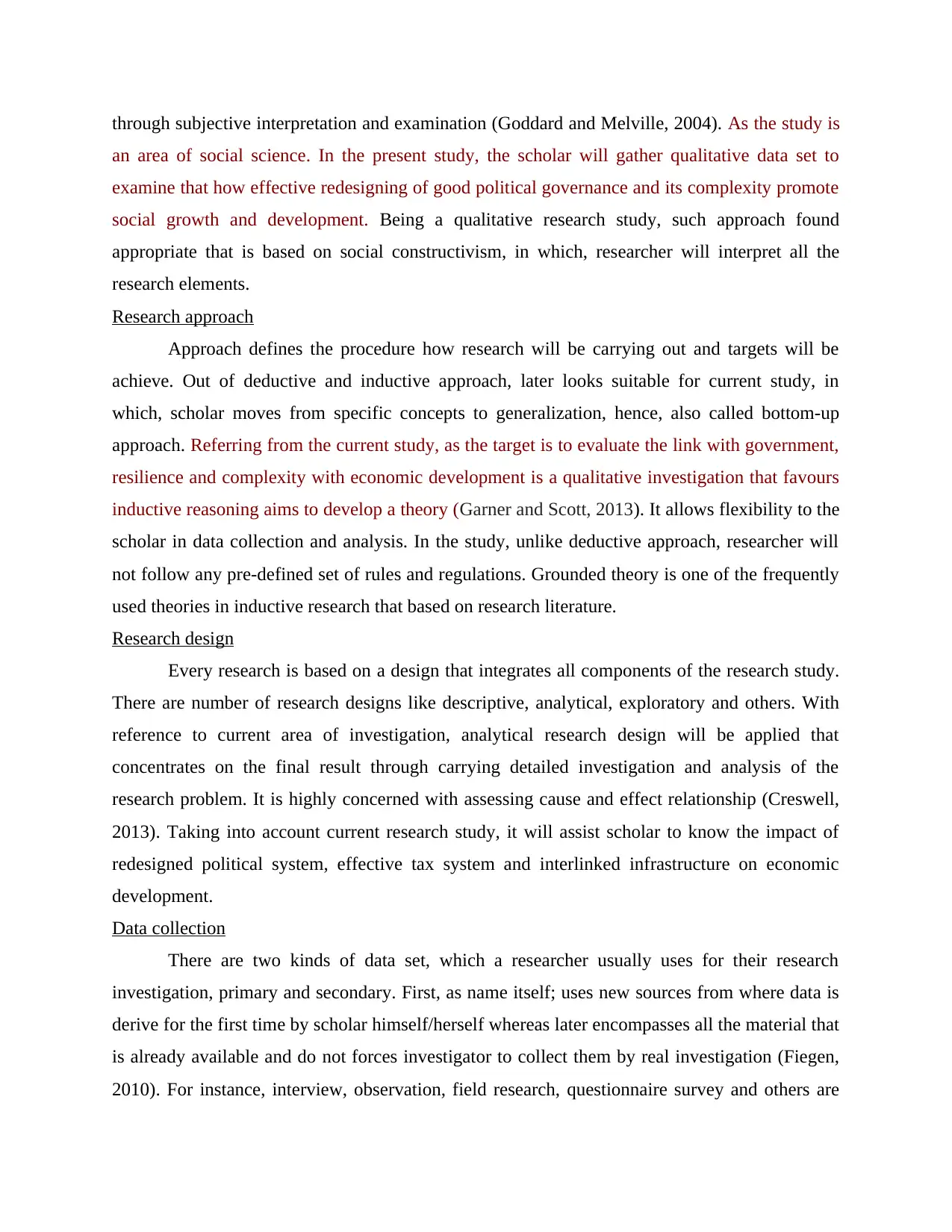
through subjective interpretation and examination (Goddard and Melville, 2004). As the study is
an area of social science. In the present study, the scholar will gather qualitative data set to
examine that how effective redesigning of good political governance and its complexity promote
social growth and development. Being a qualitative research study, such approach found
appropriate that is based on social constructivism, in which, researcher will interpret all the
research elements.
Research approach
Approach defines the procedure how research will be carrying out and targets will be
achieve. Out of deductive and inductive approach, later looks suitable for current study, in
which, scholar moves from specific concepts to generalization, hence, also called bottom-up
approach. Referring from the current study, as the target is to evaluate the link with government,
resilience and complexity with economic development is a qualitative investigation that favours
inductive reasoning aims to develop a theory (Garner and Scott, 2013). It allows flexibility to the
scholar in data collection and analysis. In the study, unlike deductive approach, researcher will
not follow any pre-defined set of rules and regulations. Grounded theory is one of the frequently
used theories in inductive research that based on research literature.
Research design
Every research is based on a design that integrates all components of the research study.
There are number of research designs like descriptive, analytical, exploratory and others. With
reference to current area of investigation, analytical research design will be applied that
concentrates on the final result through carrying detailed investigation and analysis of the
research problem. It is highly concerned with assessing cause and effect relationship (Creswell,
2013). Taking into account current research study, it will assist scholar to know the impact of
redesigned political system, effective tax system and interlinked infrastructure on economic
development.
Data collection
There are two kinds of data set, which a researcher usually uses for their research
investigation, primary and secondary. First, as name itself; uses new sources from where data is
derive for the first time by scholar himself/herself whereas later encompasses all the material that
is already available and do not forces investigator to collect them by real investigation (Fiegen,
2010). For instance, interview, observation, field research, questionnaire survey and others are
an area of social science. In the present study, the scholar will gather qualitative data set to
examine that how effective redesigning of good political governance and its complexity promote
social growth and development. Being a qualitative research study, such approach found
appropriate that is based on social constructivism, in which, researcher will interpret all the
research elements.
Research approach
Approach defines the procedure how research will be carrying out and targets will be
achieve. Out of deductive and inductive approach, later looks suitable for current study, in
which, scholar moves from specific concepts to generalization, hence, also called bottom-up
approach. Referring from the current study, as the target is to evaluate the link with government,
resilience and complexity with economic development is a qualitative investigation that favours
inductive reasoning aims to develop a theory (Garner and Scott, 2013). It allows flexibility to the
scholar in data collection and analysis. In the study, unlike deductive approach, researcher will
not follow any pre-defined set of rules and regulations. Grounded theory is one of the frequently
used theories in inductive research that based on research literature.
Research design
Every research is based on a design that integrates all components of the research study.
There are number of research designs like descriptive, analytical, exploratory and others. With
reference to current area of investigation, analytical research design will be applied that
concentrates on the final result through carrying detailed investigation and analysis of the
research problem. It is highly concerned with assessing cause and effect relationship (Creswell,
2013). Taking into account current research study, it will assist scholar to know the impact of
redesigned political system, effective tax system and interlinked infrastructure on economic
development.
Data collection
There are two kinds of data set, which a researcher usually uses for their research
investigation, primary and secondary. First, as name itself; uses new sources from where data is
derive for the first time by scholar himself/herself whereas later encompasses all the material that
is already available and do not forces investigator to collect them by real investigation (Fiegen,
2010). For instance, interview, observation, field research, questionnaire survey and others are
⊘ This is a preview!⊘
Do you want full access?
Subscribe today to unlock all pages.

Trusted by 1+ million students worldwide
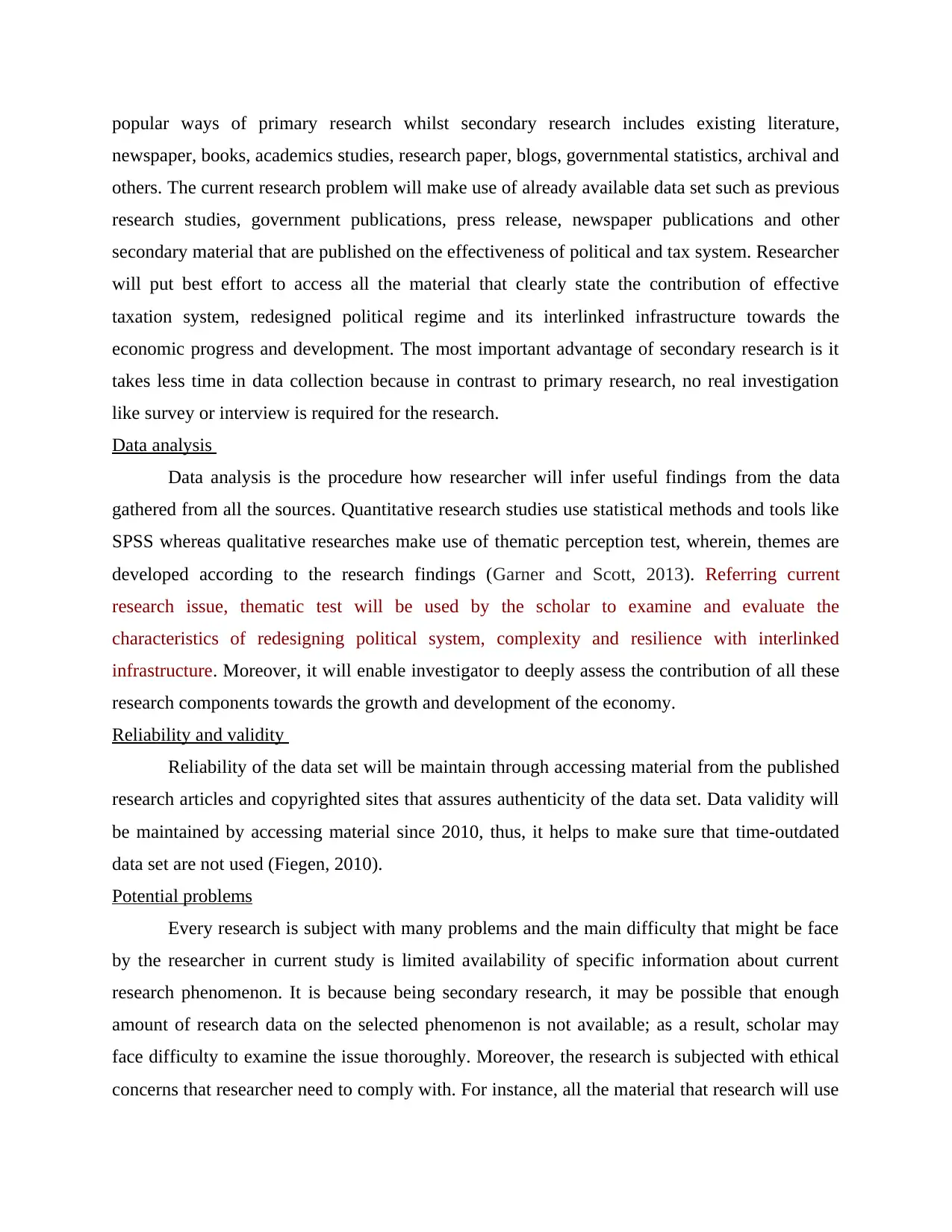
popular ways of primary research whilst secondary research includes existing literature,
newspaper, books, academics studies, research paper, blogs, governmental statistics, archival and
others. The current research problem will make use of already available data set such as previous
research studies, government publications, press release, newspaper publications and other
secondary material that are published on the effectiveness of political and tax system. Researcher
will put best effort to access all the material that clearly state the contribution of effective
taxation system, redesigned political regime and its interlinked infrastructure towards the
economic progress and development. The most important advantage of secondary research is it
takes less time in data collection because in contrast to primary research, no real investigation
like survey or interview is required for the research.
Data analysis
Data analysis is the procedure how researcher will infer useful findings from the data
gathered from all the sources. Quantitative research studies use statistical methods and tools like
SPSS whereas qualitative researches make use of thematic perception test, wherein, themes are
developed according to the research findings (Garner and Scott, 2013). Referring current
research issue, thematic test will be used by the scholar to examine and evaluate the
characteristics of redesigning political system, complexity and resilience with interlinked
infrastructure. Moreover, it will enable investigator to deeply assess the contribution of all these
research components towards the growth and development of the economy.
Reliability and validity
Reliability of the data set will be maintain through accessing material from the published
research articles and copyrighted sites that assures authenticity of the data set. Data validity will
be maintained by accessing material since 2010, thus, it helps to make sure that time-outdated
data set are not used (Fiegen, 2010).
Potential problems
Every research is subject with many problems and the main difficulty that might be face
by the researcher in current study is limited availability of specific information about current
research phenomenon. It is because being secondary research, it may be possible that enough
amount of research data on the selected phenomenon is not available; as a result, scholar may
face difficulty to examine the issue thoroughly. Moreover, the research is subjected with ethical
concerns that researcher need to comply with. For instance, all the material that research will use
newspaper, books, academics studies, research paper, blogs, governmental statistics, archival and
others. The current research problem will make use of already available data set such as previous
research studies, government publications, press release, newspaper publications and other
secondary material that are published on the effectiveness of political and tax system. Researcher
will put best effort to access all the material that clearly state the contribution of effective
taxation system, redesigned political regime and its interlinked infrastructure towards the
economic progress and development. The most important advantage of secondary research is it
takes less time in data collection because in contrast to primary research, no real investigation
like survey or interview is required for the research.
Data analysis
Data analysis is the procedure how researcher will infer useful findings from the data
gathered from all the sources. Quantitative research studies use statistical methods and tools like
SPSS whereas qualitative researches make use of thematic perception test, wherein, themes are
developed according to the research findings (Garner and Scott, 2013). Referring current
research issue, thematic test will be used by the scholar to examine and evaluate the
characteristics of redesigning political system, complexity and resilience with interlinked
infrastructure. Moreover, it will enable investigator to deeply assess the contribution of all these
research components towards the growth and development of the economy.
Reliability and validity
Reliability of the data set will be maintain through accessing material from the published
research articles and copyrighted sites that assures authenticity of the data set. Data validity will
be maintained by accessing material since 2010, thus, it helps to make sure that time-outdated
data set are not used (Fiegen, 2010).
Potential problems
Every research is subject with many problems and the main difficulty that might be face
by the researcher in current study is limited availability of specific information about current
research phenomenon. It is because being secondary research, it may be possible that enough
amount of research data on the selected phenomenon is not available; as a result, scholar may
face difficulty to examine the issue thoroughly. Moreover, the research is subjected with ethical
concerns that researcher need to comply with. For instance, all the material that research will use
Paraphrase This Document
Need a fresh take? Get an instant paraphrase of this document with our AI Paraphraser
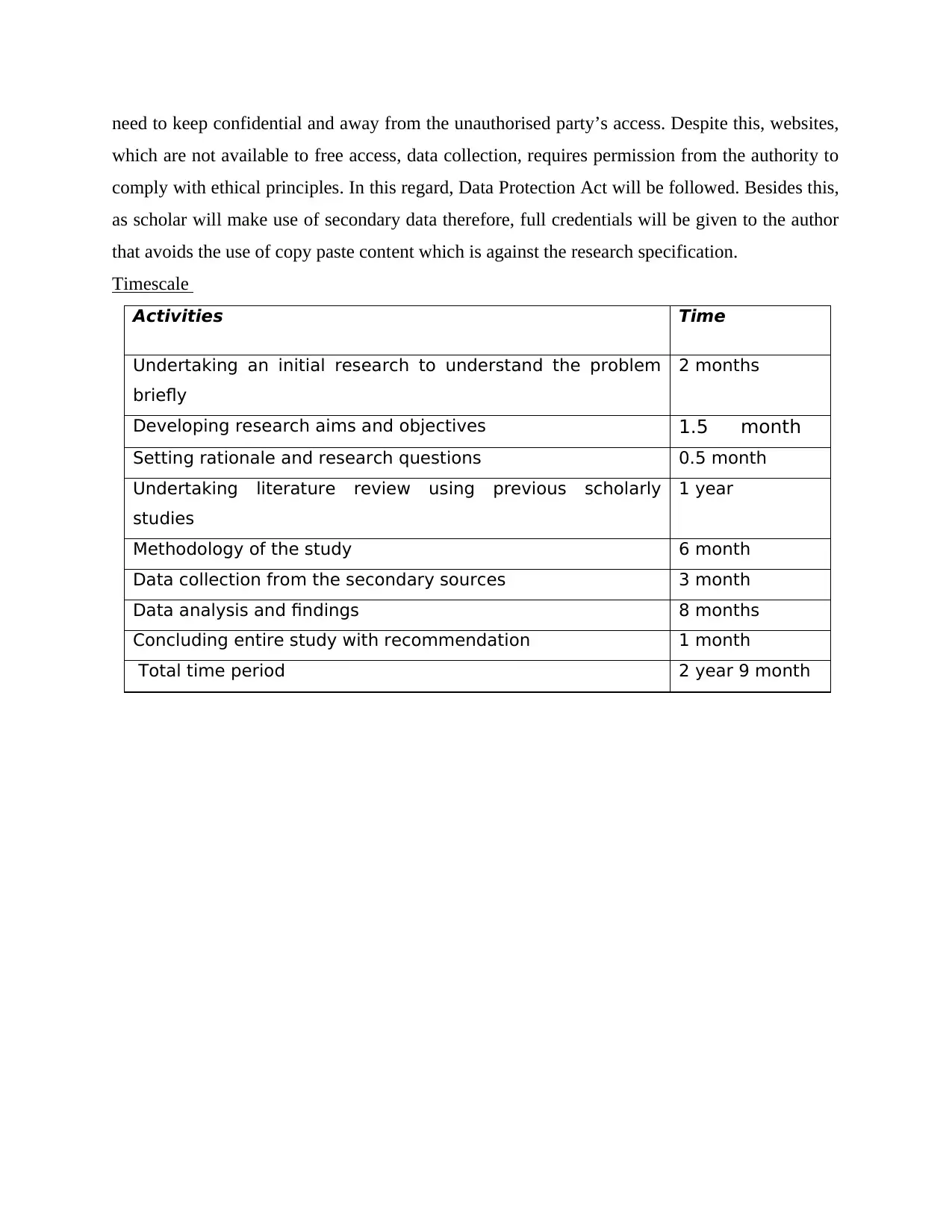
need to keep confidential and away from the unauthorised party’s access. Despite this, websites,
which are not available to free access, data collection, requires permission from the authority to
comply with ethical principles. In this regard, Data Protection Act will be followed. Besides this,
as scholar will make use of secondary data therefore, full credentials will be given to the author
that avoids the use of copy paste content which is against the research specification.
Timescale
Activities Time
Undertaking an initial research to understand the problem
briefly
2 months
Developing research aims and objectives 1.5 month
Setting rationale and research questions 0.5 month
Undertaking literature review using previous scholarly
studies
1 year
Methodology of the study 6 month
Data collection from the secondary sources 3 month
Data analysis and findings 8 months
Concluding entire study with recommendation 1 month
Total time period 2 year 9 month
which are not available to free access, data collection, requires permission from the authority to
comply with ethical principles. In this regard, Data Protection Act will be followed. Besides this,
as scholar will make use of secondary data therefore, full credentials will be given to the author
that avoids the use of copy paste content which is against the research specification.
Timescale
Activities Time
Undertaking an initial research to understand the problem
briefly
2 months
Developing research aims and objectives 1.5 month
Setting rationale and research questions 0.5 month
Undertaking literature review using previous scholarly
studies
1 year
Methodology of the study 6 month
Data collection from the secondary sources 3 month
Data analysis and findings 8 months
Concluding entire study with recommendation 1 month
Total time period 2 year 9 month
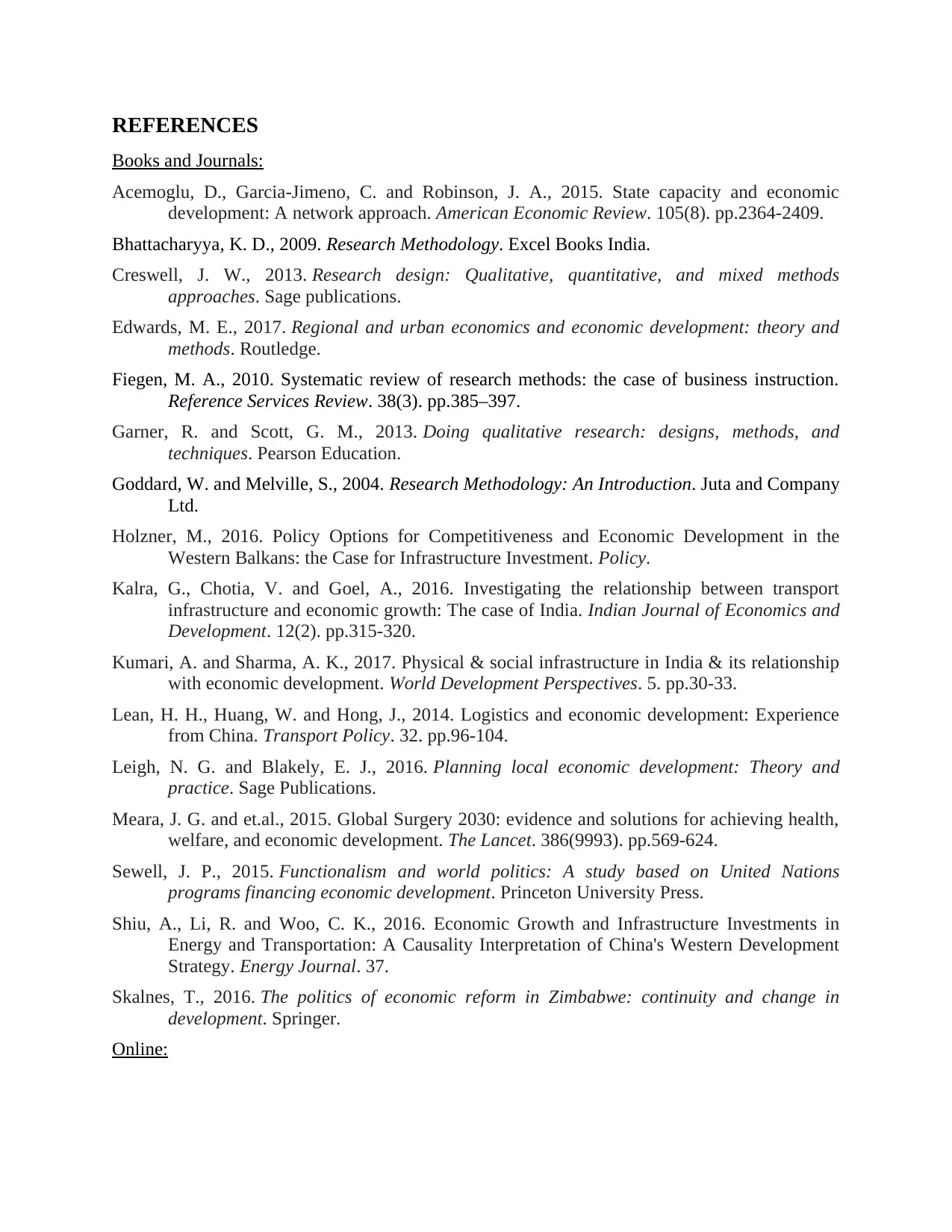
REFERENCES
Books and Journals:
Acemoglu, D., Garcia-Jimeno, C. and Robinson, J. A., 2015. State capacity and economic
development: A network approach. American Economic Review. 105(8). pp.2364-2409.
Bhattacharyya, K. D., 2009. Research Methodology. Excel Books India.
Creswell, J. W., 2013. Research design: Qualitative, quantitative, and mixed methods
approaches. Sage publications.
Edwards, M. E., 2017. Regional and urban economics and economic development: theory and
methods. Routledge.
Fiegen, M. A., 2010. Systematic review of research methods: the case of business instruction.
Reference Services Review. 38(3). pp.385–397.
Garner, R. and Scott, G. M., 2013. Doing qualitative research: designs, methods, and
techniques. Pearson Education.
Goddard, W. and Melville, S., 2004. Research Methodology: An Introduction. Juta and Company
Ltd.
Holzner, M., 2016. Policy Options for Competitiveness and Economic Development in the
Western Balkans: the Case for Infrastructure Investment. Policy.
Kalra, G., Chotia, V. and Goel, A., 2016. Investigating the relationship between transport
infrastructure and economic growth: The case of India. Indian Journal of Economics and
Development. 12(2). pp.315-320.
Kumari, A. and Sharma, A. K., 2017. Physical & social infrastructure in India & its relationship
with economic development. World Development Perspectives. 5. pp.30-33.
Lean, H. H., Huang, W. and Hong, J., 2014. Logistics and economic development: Experience
from China. Transport Policy. 32. pp.96-104.
Leigh, N. G. and Blakely, E. J., 2016. Planning local economic development: Theory and
practice. Sage Publications.
Meara, J. G. and et.al., 2015. Global Surgery 2030: evidence and solutions for achieving health,
welfare, and economic development. The Lancet. 386(9993). pp.569-624.
Sewell, J. P., 2015. Functionalism and world politics: A study based on United Nations
programs financing economic development. Princeton University Press.
Shiu, A., Li, R. and Woo, C. K., 2016. Economic Growth and Infrastructure Investments in
Energy and Transportation: A Causality Interpretation of China's Western Development
Strategy. Energy Journal. 37.
Skalnes, T., 2016. The politics of economic reform in Zimbabwe: continuity and change in
development. Springer.
Online:
Books and Journals:
Acemoglu, D., Garcia-Jimeno, C. and Robinson, J. A., 2015. State capacity and economic
development: A network approach. American Economic Review. 105(8). pp.2364-2409.
Bhattacharyya, K. D., 2009. Research Methodology. Excel Books India.
Creswell, J. W., 2013. Research design: Qualitative, quantitative, and mixed methods
approaches. Sage publications.
Edwards, M. E., 2017. Regional and urban economics and economic development: theory and
methods. Routledge.
Fiegen, M. A., 2010. Systematic review of research methods: the case of business instruction.
Reference Services Review. 38(3). pp.385–397.
Garner, R. and Scott, G. M., 2013. Doing qualitative research: designs, methods, and
techniques. Pearson Education.
Goddard, W. and Melville, S., 2004. Research Methodology: An Introduction. Juta and Company
Ltd.
Holzner, M., 2016. Policy Options for Competitiveness and Economic Development in the
Western Balkans: the Case for Infrastructure Investment. Policy.
Kalra, G., Chotia, V. and Goel, A., 2016. Investigating the relationship between transport
infrastructure and economic growth: The case of India. Indian Journal of Economics and
Development. 12(2). pp.315-320.
Kumari, A. and Sharma, A. K., 2017. Physical & social infrastructure in India & its relationship
with economic development. World Development Perspectives. 5. pp.30-33.
Lean, H. H., Huang, W. and Hong, J., 2014. Logistics and economic development: Experience
from China. Transport Policy. 32. pp.96-104.
Leigh, N. G. and Blakely, E. J., 2016. Planning local economic development: Theory and
practice. Sage Publications.
Meara, J. G. and et.al., 2015. Global Surgery 2030: evidence and solutions for achieving health,
welfare, and economic development. The Lancet. 386(9993). pp.569-624.
Sewell, J. P., 2015. Functionalism and world politics: A study based on United Nations
programs financing economic development. Princeton University Press.
Shiu, A., Li, R. and Woo, C. K., 2016. Economic Growth and Infrastructure Investments in
Energy and Transportation: A Causality Interpretation of China's Western Development
Strategy. Energy Journal. 37.
Skalnes, T., 2016. The politics of economic reform in Zimbabwe: continuity and change in
development. Springer.
Online:
⊘ This is a preview!⊘
Do you want full access?
Subscribe today to unlock all pages.

Trusted by 1+ million students worldwide
1 out of 13
Related Documents
Your All-in-One AI-Powered Toolkit for Academic Success.
+13062052269
info@desklib.com
Available 24*7 on WhatsApp / Email
![[object Object]](/_next/static/media/star-bottom.7253800d.svg)
Unlock your academic potential
Copyright © 2020–2025 A2Z Services. All Rights Reserved. Developed and managed by ZUCOL.


